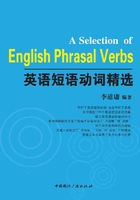Generally speaking,in the West there are two kinds of greetings:special greetings and everyday greetings.The former refers to the greetings used on special occasions,such as “Happy New Year”and “Merry Christmas”;and the latter refers to the greetings used every day,for example,“Good morning”and “How are you?”
一般说来,西方有两种问候:特别问候与日常问候。前者指用于特殊场合的祝福,如“新年好”及“圣诞快乐”;后者指用于每天的招呼,像“早上好”和“您好”。
招呼与介绍
Introductions 招呼与介绍
How are you...? 你……?
How are you going?最近怎么样?
How are you getting on?你好吗?
I m very... 我非常……
I m very pleased/happy to meet you!
遇到你真高兴!
I m very glad to see you!很高兴见到你!
It s my...to see you! 见到你是我的……!
It s my pleasure to see you!很高兴见到你!
It s my luck to meet you!见着你三生有幸啊!
It s my honor to meet you.很荣幸见到您。
How is it going with...? ……可好?
How s it going with your new job?
你的新工作怎么样?
How s it going with your mother?你母亲还好吧?
How s it going with your dissertation?
你的学位论文写得怎么样了?
Haven t...for... ……没有……
Haven t run into you for ages!好久不见了!
Haven t seen you for some time.好久不见了。
I m... 我是……
I m Jack.我是杰克。
I m Jack from America.我是从美国来的杰克。
This is... 这位是……
Hello,this is Mary!你好,这是玛莉!
This is my boss,Mr.Black.
这位是我的上司,布莱克先生。
Allow me to introduce... 请允许我介绍……
Allow me to introduce Tom to you.
请允许我把汤姆介绍给你(认识)。
Allow me to introduce myself to you,please?
请允许我自我介绍一下,好吗?
I d like to introduce... 我想介绍……
I d like to introduce Mr.Black to you.
我想介绍布莱克先生给你(认识)。
I d like to introduce my friend Brown to you.
我想介绍我的朋友布朗给你(认识)。
I d like to introduce you to Mr.Brown.
我想把你介绍给布朗先生。
I d like you to... 我想让你……
I d like you to meet my friend Galen.
你来认识一下我朋友盖伦。
I d like you to know Mr.Martin,the manager of our department.
我来给你介绍一下我们部门的经理马丁先生。
I don t think you ve met... 我认为你不认识……
I don t think you ve met Lily.我想你不认识莉莉。
I don t think you ve met Ricky,do you?
恐怕你不认识里奇,是不是?
Who s the man/woman...? ……那个人是谁?
Who s the man over there?那边的那个人是谁?
Who s the woman talking with our teacher?
那位跟我们老师讲话的妇女是谁?
Do you know...? 你知道……吗?
Do you know the girl s name?
你知道那个女孩叫什么名字吗?
Do you know that boy?你认识那个男孩吗?
Do you know who the girl standing next to Tony is?
你知道站在托尼旁边的那个女孩子是谁吗?
Do you know who that boy is?
你知道那个男孩是谁吗?
I have been... 我一直……
I ve been looking forward to meeting you.
我一直盼望着能与你见面。
I have often wanted to meet you.我一直想见你。
I have often heard about you.久仰,久仰。
I haven t had the pleasure.
我一直没有这个荣幸认识你。
I haven t got the chance.我一直没有机会认识你。
No,I don t(think)... 不,我不(认为)……
No,I don t actually.How do you do?
不,实际上我没见过。你好。
No,I don t think I do.Pleased to meet you.
不,我想我不认识。很高兴见到你。
No,I don t think so.Nice to meet you.
不,我想不是这样。见到你很高兴。
Greetings to People You Know
A:Hello,Jane!
B:Hello,Bob.Haven t seen you for some time. Where have you been?
A:I ve just come back from Hawaii.
B:You had a good time there,didn t you?
A:Yes. How have you been?
B:Same as ever,you seem to be in a hurry.
A:Yes,I ve got a meeting to attend in half an hour.
B:OK.I won t hold you up then.
A:Right.Goodbye!
B:Goodbye!
问候熟人
甲:喂,简!
乙:你好,鲍勃!有段时间没见到你了,你去哪儿了?
甲:我刚从夏威夷回来。
乙:你一定玩得很愉快吧?
甲:是的,你近来如何?
乙:老样子,你看上去很匆忙啊。
甲:是啊,半小时后我要参加一个会议。
乙:好吧,那我就不耽误你了。
甲:好的,再见!
乙:再见!
Introducing Someone
A:Who s the young man at the gate?
B:You mean the thin man in blue?
A:Yes, it seems he works for a company.
B:You re right. He works for IBM.
A:What s his name?
B:Robert Brown.
A:I suppose he likes computers very much.
B:Oh, sure. The computer is his life!
A:What do you mean? The computer is his wife?
B:More important than that. It is his life!
介绍别人
甲:门那边的年轻人是谁?
乙:你是指那个穿着蓝色外套,长得比较瘦的人吗?
甲:是的,他好像是在为一家公司工作。
乙:对,他为IBM工作。
甲:他叫什么名字?
乙:罗伯特·布朗。
甲:我想他一定非常喜欢计算机。
乙:对,计算机就是他的生命。
甲:你是什么意思? 计算机就是他的老婆吗?
乙:比那更重要,计算机是他的生命哪!
英美文化中怎样和人打招呼
我们知道,“How are you?”(你好吗?)这一句英美国家人们见面时常用的问候语,并不是真的要问别人的身体健康情况如何,而只是作为一种寒暄。如果关系一般,回答时也只需说:“Fine,thank you.”(很好,谢谢。)在与英美人士相处时,有时当我们发觉对方看上去不太舒服,那也不能按照我们的习惯直截了当地问人家:“Are you sick?”(你生病了吗?)按照英语国家的习惯,对别人健康状况表示自己的关心与同情时,可采用下面几种问候方式,而且口气要委婉、诚恳:
You sound as though you ve got a cold.
你看上去好像感冒了。
You seem rather tired.Are you OK?
你好像很疲倦,你好吗?
You look a bit pale.Are you feeling all right?
你脸色有点苍白,你感觉好吗?
你这样问了以后,如对方没有进一步的表示,你最好明智一些,马上岔开话题。即使对方承认他确是不太舒服,感觉不太好,那也不能采用中国人之间才使用的那些关心话语,说一些“要当心哦,小病不治会成大病的”之类的话。按照英美人的习惯,一般可以说:“I do hope you ll be better soon.”(希望你尽快好起来。)等。
Chatting聊天
What s the weather like...? ……天气如何?
What s the weather forecast today?今天天气如何?
What s the weather like this afternoon?
今天下午天气如何?
What s the weather like northeast?
东北方向的天气怎么样?
I wonder what the weather... 我不知道天气……
I wonder what the weather will be like tomorrow.
我不知道明天的天气怎样。
I wonder whether it s going to rain.
我不知道是否会下雨。
I wonder what it s going to be like tonight.
我不知道今晚的天气怎么样。
...weather,isn t it? 天气真……,是吧?
Lovely/Beautiful/Marvelous weather,isn t it?
天气真好,是吗?
What...weather...! 天气多……!
What lovely weather we re having!多么好的天气啊!
What a beautiful morning!早上的天气多好啊!
What a cold day!多么冷的天气啊!
The weather forecast says... 天气预报说……
The weather forecast says it will be rainy tomorrow.
天气预报说明天有雨。
The weather forecast says there s a hail tonight.
天气预报说今晚有冰霜。
The weather forecast says a thunder shower tomorrow morning.气象员预测明天上午有雷阵雨。
It s beginning to... 开始……
It s beginning to rain/snow.开始下雨/下雪了。
What s the temperature...? ……气温是多少?
What s the temperature today?今天的气温是多少?
What s the temperature going to be tomorrow?
明天的气温是多少?
What s the temperature,please?请问气温是多少?
My watch is... 我的表……
My watch is five minutes fast/slow.
我的表快/慢了5分钟。
My watch loses/gains five minutes.
我的表慢/快5分钟。
My watch doesn t work well.我的表走不准。
What day...? ……星期几?
What day is it today?今天是星期几?
What day of the week is it today?今天是星期几?
What s the date...? ……是几号?
What s the date today/tomorrow/yesterday?今天/明天/昨天是几号?
It takes...to do sth. 花……时间做某事。
It takes me the whole noon to finish the work.
完成这项工作花了我一个中午的时间。
It took me ten days to take the trip.
这次旅行花了我10天的时间。
It took me ten days to finish the book.
完成这本书花了我10天的时间。
Which job do you prefer...? 你最喜欢做什么工作……?
Which job do you prefer,an accountant or a secretary?你喜欢做什么工作,会计还是秘书?
Which job do you prefer,a teacher or a lawyer?
你喜欢做什么工作,老师还是律师?
What sort of job would you like to take?
你想做什么样的工作?
...be good at... ……擅长……
I m good at English.我擅长英语。
He s good at every subject.他每科都很好。
Do you often...? 你经常……吗?
Do you often drop in on your friends?
你经常拜访你的朋友吗?
Do you often work an extra shift?你经常加班吗?
Are you smoking...? 你现在抽烟……吗?
Are you smoking a lot?你现在抽烟多吗?
Are you smoking less?你现在抽烟少了吗?
Would you like...? 你想……吗?
Would you like a cigarette?想抽支烟吗?
I ve got a packet of “Marboro”.Would you like to try one?我有一包“万宝路牌”的烟。你想来一支吗?
Have you got...? 你有……吗?
Have you got a book of matches?你有火柴吗?
Have you got a lighter?你有打火机吗?
How old...? ……多大?
How old do you think he is?你看他多大岁数?
How old is your brother?你兄弟多大岁数?
How old are you?你多大岁数?
Are you the...in your family? 你是家中最……的吗?
Are you the oldest/youngest in your family?
你在家中年龄最大/小吗?
How do you...? 你是怎么……?
How do you maintain a good friendship?
你是怎么维持友谊的?
How do you make new friends?
你是怎么交新朋友的?
Do you realize...? 你知道……吗?
Do you realize that this football is on sale?
你知道这个足球在打折销售吗?
Do you realize that you were supposed to clean the house last week?
你知道你上星期就应该清扫房子吗?
Do you realize how easy it is to sell a TV?
你知道把一台电视卖掉有多简单吗?
Do you realize that all of these shirts are half off?
你知道这些衬衫都卖半价吗?
Did you hear about...? 你听说过……没有?
Did you hear about my new car?
你听说过我的新车没有?
Did you hear about the game last night?
你听说昨晚的比赛没有?
Did you hear about the meeting on Friday?
你听说星期五的会议没有?
Did you hear about your brother s girlfriend?
你听说你哥哥的女朋友了吗?
I hear... 我听说……
I heard that John got a new job.
我听说约翰找到了一份新工作。
I heard that you won the contest.我听说你赢了比赛。
I heard that your TV broke.我听说你的电视坏了。
I heard that you got all A s this semester.
我听说你这学期拿到了全优成绩。
Any idea...? 知道……吗?
Any idea when you re coming home?
你知道你何时要回家吗?
Any idea how you re supposed to put this together?
你知道这个怎么组合在一起吗?
Any idea what this letter means?
你知道这封信是什么意思吗?
Any idea when Joe is leaving for Hawaii?
你知道乔什么时候要去夏威夷吗?
I m thinking about... 我在考虑……
I m thinking about buying a new car.
我在考虑买部新车。
I m thinking about getting some new pants.
我在考虑买几条新裤子。
I m thinking about going on vacation.
我在考虑去度假。
I m thinking about watching some TV.
我在考虑看会儿电视。
Do you think...? 你认为……?
Do you think I should go to work tomorrow?
你认为我明天应该去上班吗?
Do you think that McDonald is very good?
你认为麦当劳很好吗?
Do you think you ll like your new job?
你想你会喜欢你的新工作吗?
Do you think the wedding will be nice?
你想婚礼会办得好吗?
It s...today. 今天……
It s blasting/extremely hot today.今天热极了。
It s a scorcher today.今天热极了。
It s a terrible/an awful day today.真糟糕的天气。
It s so bad day today.真糟糕的天气。
The temperature has... 气温……
The temperature has dropped to minus 25degrees centigrade.气温降到了零下25摄氏度。
The temperature has dropped 18degrees centigrade below zero.气温降到了零下18摄氏度。
Talking about Hobbies
A:What do you like to do in your spare time?
B:I m fond of fishing and swimming.
A:Do you like playing chess?
B:Yes,but I m not very good at it.
A:Shall we have a few games this evening?
B:Yes,that d be very nice.Let s begin at eight.
A:You ve got it.
谈论爱好
甲:你在闲暇时间喜欢做些什么?
乙:我喜欢钓鱼和游泳。
甲:你喜欢下象棋吗?
乙:喜欢,但下得不好。
甲:今天晚上下几盘怎么样?
乙:太好啦,8点钟开始吧。
甲:就这么定了。
Talking about Festivals
A:Christmas is coming up. What are you going to do,Lin Qing?
B:I will visit my uncle. He has invited me to stay with them during the Christmas holiday.
A:I’m sure you’ll have a wonderful time. Do you celebrate Christmas in China?
B:Some do and some don’t. But now more and more young people celebrate it. They send Christmas cards to each other and hold Christmas parties. How do you celebrate the holiday then?
A:Well, Christmas used to be a religious holiday, but now it is a holiday for almost everyone in the country. We have family reunion, exchange presents and have sumptuous feasts.
B:So you have great fun just as we do at the Spring Festival.
A:The Spring Festival? What’s the Spring Festival?
B:That is Chinese New Year, and we treat it as the biggest day of the year.
A:I see.
B:Do you have any plans for this Christmas, Mrs.Smith?
A:We haven’t decided what to do yet. Perhaps we’ll just stay home.
谈论节日
甲:圣诞节快到了。你打算做什么,林清?
乙:我要去看叔叔。他邀请我和他们一起过圣诞节。
甲:我相信你一定会过得非常愉快。在中国你们过圣诞节吗?
乙:有人过,有人不过。不过现在越来越多的年轻人过起这个节来。他们互相寄圣诞卡,还举行圣诞晚会。你们怎么过圣诞节呢?
甲:嗯,圣诞节以前是个宗教节日,但是现在在美国几乎人人都要过这个节。家人们来往团聚、交换礼物、共进丰盛的晚餐。
乙:这么说你们开心得就像我们过春节。
甲:春节,什么叫春节?
乙:那是中国的新年,我们把它看作是一年当中最重要的一天。
甲:我懂了。
乙:这次圣诞节你们有什么打算吗,史密斯夫人?
甲:我们还没有决定做些什么。也许我们就呆在家里。
关于电视节目
电视在普及,电视节目也越来越丰富,电视节目已经成为人们百谈不厌的话题。电视节目繁多,趣味性强,这为人们的交流提供了丰富的内容,也使得口头交流容易进行。谈论电视节目时,人人都可以发表自己的评论,或喜欢或不喜欢,或褒或贬,只要有利于人际交流,就没有什么特别的限制。
Parting 分别
See you... ……见
See you later.回头见。
See you next week.下周见。
See you tomorrow.明天见。
See you again.再见。
I must... 我得……
I must go now.我得走了。
I must be going now.我现在得走了。
I must be off.我得走了。
Have a...! ……愉快!
Have a nice vacation/nice trip!假期/旅途/愉快!
Have a good time/weekend!玩得/周末愉快!
...to your family. 问候你的家人……
Give my love/regards to your family.
代我向你家人问好。
Best regards to your family.代我问候你家人。
Goodbye... ……再见!
Goodbye until later.以后见!
Goodbye until next time.下次见!
Goodbye for now.暂时再见了!
I ll... 我会……
I ll try to catch you later.我会设法再和你面谈的。
I ll catch you later.以后我会再和你面谈的。
I ll talk to you soon.很快我会再和你谈的。
I ll be seeing you.我们会再见面的。
I ll see you real soon.我很快就会再见到你。
I hope... 我希望……
I hope we can meet again.我希望我们再见面。
I hope we meet again.我希望我们再见面。
I hope to meet you again.我希望再见到你。
I hope I can see you again.我希望能再看到你。
I hope we see each other again.
我希望彼此能再见面。
I hope we run into each other again.
我希望我们能再碰面。
Thank you for...,bye! 谢谢你的……,再见!
Thank you for coming,bye!谢谢你的光临,再见!
Thanks for your visit,bye!谢谢你的光临,再见!
I m afraid I must... 我恐怕必须……
I m afraid I must run/rush.我恐怕得赶紧走了。
I have to... 我得……
I have to get up early tomorrow.明天我还得早起呢。
I have to catch the bus back.我得赶车。
I ll see you in... 我们……见。
I ll see you in an hour or two.我们一两个小时后见。
I ll see you in a little while.我们等一会儿见。
I ll see you in a few minutes.我们几分钟后见。
I really must go,... 我真的要走了,……
I really must go,or I ll miss my train.
我真的要走了,不然的话我会赶不上火车的。
I really must be going.It s rather late and I ve got to catch the late bus.
我确实要走了,时间太晚了,我还得赶晚班车。
Well,... 好的,……
Well,better be moving,I suppose.哦,我想我该走了。
Well,I d better let you go.好了,我该让你走了。
Well, let s leave it at that.好了,我们就到此为止吧。
Calling to Say Goodbye
A:I m calling to say goodbye.
B:When do you leave?
A:I m catching the 11:00 train.
B:Take care of yourself and don t forget to keep in touch.
A:Goodbye.Thanks again for everything.
打电话告别
甲:我打电话向你告别来了。
乙:你何时启程?
甲:我准备赶11点的火车。
乙:多多保重,别忘了保持联系。
甲:再见了。再次谢谢你的一切。
Wishes as Saying Goodbye
A:Hello,Mr.Smith.I ve come to say goodbye.
B:You re leaving so soon? When are you off?
A:Early tomorrow morning.
B:We ll miss you.Hope to see you again someday.
A:I hope so,too.Thank you,Mr.Smith,for everything you have done for me during my stay here.
B:You re welcome.
A:Don t forget to give me a call if you re ever in Beijing.Take care of yourself.Bye!
B:Take care.Bye! Have a good journey,and all the best.
临别祝愿
甲:您好,史密斯先生。我是来和你道别的。
乙:你这么快就要走了?你什么时候离开?
甲:明天一大早。
乙:我们会惦念你的。希望有一天再见到你。
甲:我也这样希望。史密斯先生,谢谢您在我逗留期间给我的一切帮助。
乙:别客气。
甲:假如您来到北京了,别忘了给我打电话。多保重。再见。
乙:保重。再见!一路顺风,万事如意。
国外送客的习惯
国外“parting”(送客)与我国不同的是,送客只送到大门口,作为客人无须说:“Stay where you are.”(请留步。)“Don t come any further.”(不要远送了。)之类的话,因为除非你邀请,不然你就别指望人家远送你。这并不是西方人对客人不够热情,而只是中外文化传统不同罢了。
Communication Barriers 交际障碍
Sorry,... 抱歉,……
I m sorry,I don t understand.
抱歉,我听不懂你在说什么。
Sorry,I don t speak English.
抱歉,我不会说英语。
Sorry, my English isn t very good.
抱歉,我的英语不怎么好。
do/can not catch/follow... 不明白……
I didn t quite catch you.
对不起,我没听懂你说的话。
I can t follow you.我不明白您说什么。
Could you...? 你可以……吗?
Could you write it down,please?
您能把它写下来吗?
Could you spell that?您能把它拼一下吗?
If there s anything/something...,
please... 如果还有什么 ……,请……
If there s anything you are still not clear about,please say so.如果您还有什么不明白,请提出来。
If there s still something you don t understand,please let me know.如果您还有什么不明白,请提出来。
Do you...what I mean? 你……我的意思了吗?
Do you see/get/know what I mean?你明白我的意思了吗?
Don t...,if... 如果……,就不要……
Don t date that girl,if you see what I mean.
如果你明白我的意思,就不要和那个女孩约会。
Don t get involved in politics,if you take my point.
如果你明白我的意思,就不要参与政治。
Beg Your Pardon
A:Where are you from?
B:Pardon me?Could you say it again?
A:I said,“Where are you from?”
B:I am from China.I have only been here one week.
A:Welcome to the United States.Where do you live?
B:I m sorry.What did you say?
A:I asked you where you live.
B:I live with some relatives in San Francisco.
对不起,我没听清楚
甲:你是从哪里来的?
乙:对不起,没听清楚,请再说一遍。
甲:我说:“你是从哪里来的?”
乙:我从中国来。我到这儿只有一星期。
甲:欢迎到美国来。你住哪儿呀?
乙:对不起,你说什么?
甲:我是问你住在哪里。
乙:我跟我的亲戚住在旧金山。
Speak Slower
A:Where are you from?
B:I m from China.
A:Do you speak English?
B:Yes,a little.
A:Sign your name here,please.
B:Pardon? Could you speak a little slower?
A:Write down your name here,please.
B:I see.
A:Where are you going?
B:Washington D.C.
说慢一点
甲:您是哪里人?
乙:我是中国人。
甲:您会说英语吗?
乙:会一点儿。
甲:请在这里签上您的名字。
乙:对不起,您能说得慢一点吗?
甲:请在这里写下您的名字。
乙:我明白了。
甲:您要到哪里去?
乙:首都华盛顿。
出国留学时的语言问题
每年都有许多人打算出国留学,他们为此作了充分的准备,但是,一旦踏入一个完全陌生的国度时,一些人却发现他们对该国的语言知之甚少,不能与当地人进行正常的交流。他们不能理解别人,也不能使自己被别人理解,这就是语言障碍,它妨碍了很多人的出国梦想。虽然有些人学了几年外语,但仍然感到很难理解外国人。因此克服语言障碍十分关键。语言是交流最基本的工具,没有语言,一个人将会陷入大麻烦。怎样克服语言障碍又是一个大问题。然而最重要的是,学习是解决这一问题的最有效途径,学习一门外语需要花费相当长的时间,同时学习者还要熟悉该国的文化习俗。
When we meet someone and develop a relationship with that person we usually want to find out about the person s family. And the subject of family is a frequently discussed topic in all aspects of our lives.
Americans usually have one or two children. Children often move out of their parents house when they re 18. Also, many children leave home when they go to university. Older relatives live by themselves, with friends or with other relatives. Some older people live in retirement homes, but not many.
Families have reunions on Christmas and Thanksgiving. Sometimes relatives arrange big reunions. Then, uncles, cousins, brothers and sisters meet together. Sometimes they have to come from far away. That s because American family members don t always live near each other.
当人们彼此之间熟悉以后,通常都会希望了解对方家庭的情况。而且,关于家庭的话题也是我们生活中经常会谈论到的话题。
美国人通常有一两个小孩。这些小孩通常都在18岁时就搬出父母的房子,也有很多孩子离开家去大学就读。老一辈的都自己住,或者跟朋友住,要不然就跟其他亲戚一起住。有些年纪比较大的人住在敬老院,但为数不多。
家人们都会在圣诞节或感恩节团圆,有时候亲戚们也会安排全家大团圆的聚会。届时,叔伯、堂兄弟姐妹、哥哥、姐姐、弟弟、妹妹全都聚在一起,有时候他们还得从很远的地方赶来,那是因为美国的家人与家人之间并非都住得很近。















